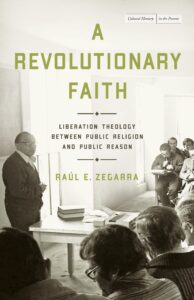Raul E. Zegarra embarks in the type of study that I wish I had had in my hands when I started researching liberation theology over a decade ago. Decades after the emergence of Peruvian theologian’s Gustavo Gutiérrez’s nascent theology, we can see that the claim of a “revolutionary Theology” actually rings true: “liberation theology radically transformed the Christian tradition” (4). Liberation theology accomplished this by advocating for ordinary Christians to be involved in concrete political action. One of the core ideas of liberation theology is that it values modern ideas of social-political theory without confining religious thought only to sacred spaces (26). In fact, Zegarra argues that the impact of Gutiérrez’s liberation theology on intellectual thought was successful because “it was able to remain within the boundaries of still recognizable mainstream Christian theological reflection” (35). The book takes Gutiérrez seriously enough as a public theologian to engage public political theory rather than just see him as someone debated within the confines of seminary classrooms. This premise offers a refreshing shift in the literature of liberation theology.
Zegarra opens the book with an examination of the historical shift that came with liberation theology. He also provides helpful definitions of the basic tenets of this tradition. He follows this by establishing Gutiérrez’s Christian theological credentials. Leaning on the theories of Paul Ricoeur, Hans Joas, and David Tracy, Zegarra applies a “pragmatic-hermeneutic” to the main tenets of Christology, with special emphasis on the hope of Christ’s Second Coming, linking it to Gutiérrez’s own hermeneutical key of the preferential option for the poor (54, 72). In short, the future hope that comes with Christ’s return means the possibility of political action in the present.
One of the highlights of the book is the Peruvian context of Gutiérrez’s thought, particularly as he reports of recent interviews he conducted with Gutiérrez. Hearing the voice of the contemporary Gutiérrez in light of recent events, and answering some criticisms of liberation theology’s legacy, helps to establish the continual relevancy of Gutiérrez’s work. One of the biggest contentions related to liberation theology—both within and outside the Christian tradition—is just how of it is just repackaged Marxist thought. Zegarra contends that Marxism was not a “dominant force” of Gutiérrez’s liberation theology, especially the ultra-violent type found in the Peruvian group the Shining Path (82, 89). Gutiérrez’s theology was faith-based at its core and never ascribed to political violence. Much of liberation theological literature features only material that was translated into the 1990s, so it is refreshing to see Gutiérrez’s recent thoughts.
According to Zegarra, Gutiérrez’s theology always had a liberal, democratic component, which advocated for the poor and marginalized in the name of human rights. For example, he places Gutiérrez’s thought in dialogue with philosopher John Rawls; this type of constructive comparative work continues to yield food for thought. Anyone interested in recent political theory or liberation theology will find this book interesting as Zegarra holds Rawls’s work in high regard, as one of the most important theories on social justice in recent times. As he notes, thinks there is a “strong analogy” to the work of Gutiérrez (141, 149). Moreover, Zegarra’s position on the positive impact of religion on society takes seriously the fact that the Americas are “still heavily religious societies” and so this book doesn’t waste too much time trying to make a case for public theology (154). He points out that historically religious freedom was brought about by Martin Luther King Jr’s civil rights movement just as Gutiérrez’s stance against the militant violence of the Shining Path (135). Public expressions of religion continue to be historically relevant, and Zegarra’s book should be widely read in order that Gutiérrez’s lasting legacy be grasped and appreciated.
Vanguard University




